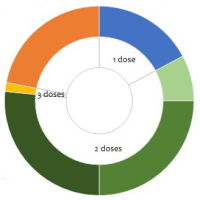With the COVID-19 pandemic currently being the main factor to be considered in the health and well-being assessments, other elements, such as quality of air, smoking and alcohol consumption, and obesity also contribute to the state of health of European populations, says a new report from the European Commission.
You might also like: WHO Survey Focusses on Disruptions to Essential Health Services
The ‘State of Health in the EU’ cycle, an initiative launched in 2016 by the European Commission in collaboration with the OECD, aims to improve the health of citizens and performance of health systems across EU member states. This includes publication of a two-year cycle report known as ‘Health at a Glance’, which provides comprehensive data and analyses useful in identifying both the strengths and the opportunities for improvement in public health. As expected, the COVID-19 pandemic is a key focus of this year's ‘Health at a Glance: Europe 2020’ report.
Lessons from COVID‑19 Crisis
Up until October 2020, just a few countries in Europe (i.e. Finland, Norway, Estonia) were able to contain the coronavirus spread and mitigate the economic impacts. Geographic factors (lower population density) aside, timely implementation of containment protocols and strong trust and compliance by citizens were key in controlling the outbreak.
Older people (often with chronic conditions) have been disproportionately hit by the contagion – those aged 60 and over comprised at least 90% of COVID-19 deaths. In many countries, about half or more of COVID‑19 deaths were amongst residents in long-term care (LTC) facilities. However, many countries failed to include protecting LTC residents and workers when mounting initial responses to the pandemic. Protecting older people and other vulnerable populations from COVID‑19 is necessary to reduce hospitalisations and deaths.
The pandemic remains active, hence at this time it is difficult to provide an overall assessment of country responses to COVID‑19. This crisis, however, has highlighted the need to consider the resilience of health systems as an important dimension of their performance alongside accessibility, quality of care, and efficiency.
Regarding access to care, most EU countries have achieved universal health coverage – crucial in this time of pandemic – although the range of services covered and the degree of cost-sharing vary widely. Effective access to different types of care can also be restricted due to shortages of health workers (such scarcity has been highlighted by COVID-19), long waiting times or long travel distances to the closest healthcare facility. The crisis also underscores the need for mechanisms to mobilise human resources quickly in times of crisis.
Furthermore, COVID‑19 mortality has a clear social gradient: poor people and ethnic minorities were also disproportionately affected. This is a bleak reminder of the importance of the social determinants of health. Social and economic policies and interventions beyond the health system are needed address the root causes of inequalities.
Addressing Health and Welfare Impact of Air Pollution
Air pollution causes about €600 billion in economic and welfare losses annually across EU countries, equivalent to 4.9% of EU GDP in 2017. Death rates from air pollution are particularly high in Central and Eastern Europe because of increased use of fossil fuels. Other major sources of emissions are transportation and the residential sector, as well as industrial and agricultural activities. Multi-sectoral approaches are needed to combat air pollution, such as promotion of a green economic recovery and minimising healthcare's environmental footprint.
Reducing Other Important Risk Factors to Health
There are a number of modifiable risk factors that also have important impacts on people’s health and mortality, notably smoking, alcohol consumption, unhealthy nutrition, lack of physical activity and obesity.
Across EU, smoking accounts for about 700,000 deaths annually. Tobacco use remains the largest behavioural risk factor to health, notwithstanding progress in reducing smoking rates over the last decades. Meanwhile, harmful consumption of alcohol results in 255,000 to 290,000 deaths in EU each year. One-third of adults report at least one ‘binge drinking’ event in the past month, and more than one‑fifth of adolescents aged 15 years old report having been drunk more than once in their life.
Meanwhile, more than one in six adults are obese across EU, with obesity rates continuing to increase in most EU countries. There are wide socioeconomic inequalities in overweight and obesity rates, often starting at a young age – i.e. rates are two times greater among children living in the lowest income families compared to those living in the highest income families. Note that obesity is also known to be a risk factor for complications from COVID-19.
Source and image credit: European
Commission



























